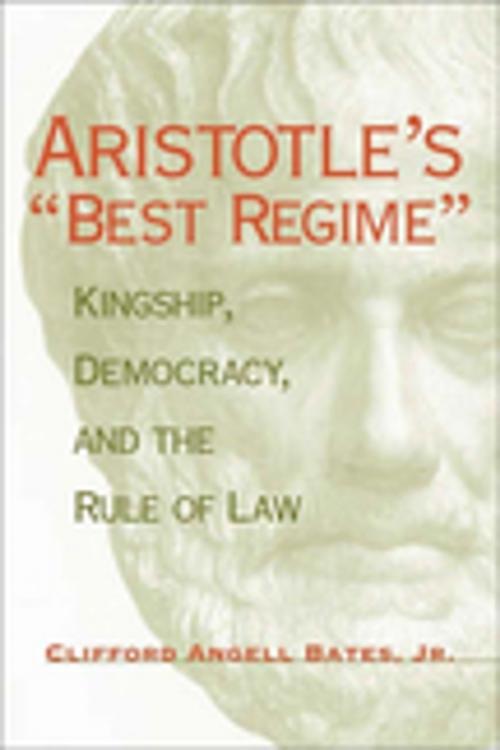Aristotle's "Best Regime"
Kingship, Democracy, and the Rule of Law
Nonfiction, Social & Cultural Studies, Political Science| Author: | Clifford A. Bates Jr. | ISBN: | 9780807152393 |
| Publisher: | LSU Press | Publication: | December 1, 2002 |
| Imprint: | LSU Press | Language: | English |
| Author: | Clifford A. Bates Jr. |
| ISBN: | 9780807152393 |
| Publisher: | LSU Press |
| Publication: | December 1, 2002 |
| Imprint: | LSU Press |
| Language: | English |
The collapse of the Soviet Union and other Marxist regimes around the world seems to have left liberal democracy as the only surviving ideology, and yet many scholars of political thought still find liberal democracy objectionable, using Aristotle's Politics to support their views. In this detailed analysis of Book 3 of Aristotle's work, Clifford Angell Bates, Jr., challenges these scholars, demonstrating that Aristotle was actually a defender of democracy.
Proving the relevance of classical political philosophy to modern democratic problems, Bates argues that Aristotle not only defends popular rule but suggests that democracy, restrained by the rule of law, is the best form of government. According to Aristotle, because human beings are naturally sociable, democracy is the regime that best helps man reach his potential; and because of human nature, it is inevitable democracies will prevail.
Bates explains why Aristotle's is a sound position between two extremes -- participatory democracy, which romanticizes the people, and elite theory, which underrates them. Aristotle, he shows, sees the people as they really are and nevertheless believes their self-rule, under law, is ultimately better than all competing forms. However, the philosopher does not believe democracy should be imposed universally. It must arise out of the given cultural, environmental, and historical traditions of a people or its will fall into tyranny.
Bates's fresh interpretation rests on innovative approaches to reading Book 3 -- which he deems vital to understanding all of Aristotle's Politics. Examining the work in the original Greek as well as in translation, he addresses questions about the historical Aristotle versus the posited Aristotle, the genre and structure of the text, and both the theoretical and the dialogic nature of the work. Carting Aristotle's rhetorical strategies, Bates shows that Book 3 is not simply a treatise but a series of dialogues that develop a nuanced defense of democratic rule.
Bates's accessible and faithful exposition of Aristotle's work confirms that the philosopher's teachings are not merely of historical interest but speak directly to liberal democracy's current crisis of self-understanding.
The collapse of the Soviet Union and other Marxist regimes around the world seems to have left liberal democracy as the only surviving ideology, and yet many scholars of political thought still find liberal democracy objectionable, using Aristotle's Politics to support their views. In this detailed analysis of Book 3 of Aristotle's work, Clifford Angell Bates, Jr., challenges these scholars, demonstrating that Aristotle was actually a defender of democracy.
Proving the relevance of classical political philosophy to modern democratic problems, Bates argues that Aristotle not only defends popular rule but suggests that democracy, restrained by the rule of law, is the best form of government. According to Aristotle, because human beings are naturally sociable, democracy is the regime that best helps man reach his potential; and because of human nature, it is inevitable democracies will prevail.
Bates explains why Aristotle's is a sound position between two extremes -- participatory democracy, which romanticizes the people, and elite theory, which underrates them. Aristotle, he shows, sees the people as they really are and nevertheless believes their self-rule, under law, is ultimately better than all competing forms. However, the philosopher does not believe democracy should be imposed universally. It must arise out of the given cultural, environmental, and historical traditions of a people or its will fall into tyranny.
Bates's fresh interpretation rests on innovative approaches to reading Book 3 -- which he deems vital to understanding all of Aristotle's Politics. Examining the work in the original Greek as well as in translation, he addresses questions about the historical Aristotle versus the posited Aristotle, the genre and structure of the text, and both the theoretical and the dialogic nature of the work. Carting Aristotle's rhetorical strategies, Bates shows that Book 3 is not simply a treatise but a series of dialogues that develop a nuanced defense of democratic rule.
Bates's accessible and faithful exposition of Aristotle's work confirms that the philosopher's teachings are not merely of historical interest but speak directly to liberal democracy's current crisis of self-understanding.















